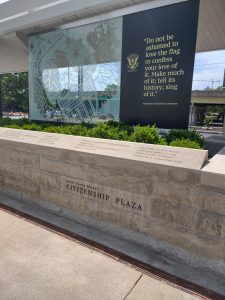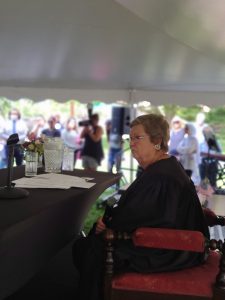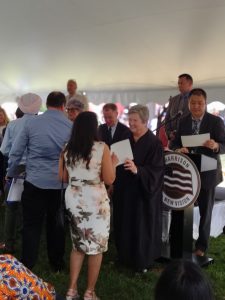Subscriber Benefit
As a subscriber you can listen to articles at work, in the car, or while you work out. Subscribe NowAmong the members of the legal community she is known as Judge Barker, and within the Southern Indiana District Court family she is affectionately called SEB, but Senior Judge Sarah Evans Barker will now become familiar to those outside the courtroom, as the Benjamin Harrison Presidential Site has recognized her contributions to the state and the nation by naming its new citizenship plaza in her honor.
The new Sarah Evans Barker Citizenship Plaza was dedicated July 1 at a special event held after the Southern Indiana District Court senior judge presided over her 20th naturalization ceremony at the presidential site. Barker’s children and grandchildren, “court family,” and other friends and professional acquaintances recounted and applauded her tireless efforts in public life.
“Her contributions to civil rights, human rights, and gender and racial equality are pivotal to the improvements of our society, and are part of her legacy,” Southern Indiana District Court Chief Judge Tanya Walton Pratt told the gathering. “She has handled many important and often high-profile cases and has been a courageous champion protecting the constitutional rights of all citizens.”

Barker, a native of Mishawaka and graduate of the American University School of Law, was nominated to the federal bench by President Ronald Reagan and became Indiana’s first woman federal judge when she was confirmed in March 1984. She served as chief judge of the Southern Indiana District Court from 1994 to 2001 and took senior status in 2014.
Throughout her career, Barker has been active in numerous civic, educational, cultural and religious organizations. She has also been engaged in judicial and bar-related activities, including serving in the Federal Judges Association, the Judicial Conference of the United States and on the federal Judicial conduction and Disability Committee.
The presidential site highlighted Barker’s “exceptional service as a federal judge” and described her as exemplifying the “very best qualities” that the country seeks from the judiciary. Those qualities include “impartiality, intelligence, wisdom, gravitas and a deep and abiding respect for the Constitution.”
Charles Hyde, president and CEO of the Benjamin Harrison Presidential Site, led the dedication ceremony and recalled his lunch with Barker shortly after he took over the top job at the Harrison home. She impressed upon him the importance of the site to the country’s civic life, he said.
“It’s hard to find a public figure today so universally admired,” Hyde said at the dedication. “Just as importantly, even those who find themselves in disagreement with Judge Barker still respect her for her exceptional integrity, intelligence, thoughtfulness, jurisprudence and independence. It’s impossible not to respect her for her relentless efforts seeking out truths and ensuring justice through law.”
The citizenship plaza is part of the $6 million Old Glory, New Vision addition to the presidential site. An outdoor space at the edge of the home’s south lawn, the plaza includes the Book of History, honoring the more than 1,500 new citizens who Barker has naturalized on the grounds of the museum since 2003; three monuments made from Indiana limestone and displaying copies of the Declaration of Independence, the U.S. Constitution and the Bill of Rights; and an 89-foot tall flagpole commemorating Harrison’s call for the Pledge of Allegiance to be recited by school children and the American flag to be flown at schools and public buildings.
Walton Pratt said the honor was bestowed after the capital campaign had ended. No money was raised for the plaza with the knowledge it would be named after Barker.
“On behalf of the judges and staff and the entire federal family in the Southern District of Indiana, Judge Barker, please know that we love you, we are proud of you and honored to be with you today on this happy and momentous occasion – the dedication of the Sarah Evans Barker Citizenship Plaza,” Walton Pratt said.
New citizens
Fittingly, the naming ceremony came immediately after Barker presided over the naturalization ceremony.
Walton Pratt noted Barker has a “deep respect” for those who left their homes to come to America to “seek a better, more free way of life,” and has described presiding over the ceremonies as a privilege. The chief judge pointed to the naturalization ceremony which followed the 2016 president election where Barker’s “compassionate, honest and positive message” gained national attention.

Walton Pratt quoted Barker as telling the new citizens, “I am so grateful for our country and for all it has given me. I count my blessings every single day that I am an American and I still believe, as deeply as I ever had, that if we stand together and work together with respect for our differences a, strengthen our convictions and love for this nation, our best days are still ahead of us.”
The July 1 naturalization ceremony was held under a big white tent with Barker seated in a very ornate chair on the stage at the front. She presided over the event with the ease and charm of a late-night TV host, explaining the process, introducing speakers, and talking to the new citizens as if they were all old friends.
After the Southern Indiana District Clerk of Court Roger A.G. Sharpe administered the oath, Barker asked the new citizens, “Does it feel different?”
The keynote address was delivered by Azher Khan, founder and chair of Calderon Textiles, who recounted his journey to becoming an American citizen and spoke of the power of love for oneself, for family and for country. Following his remarks, Barker told the crowd they had just heard the “speech from the coach in the locker room.”
Moo Chri, the youngest person being naturalized, was called to the front to lead the crowd in the Pledge of Allegiance. After realizing a large flag was not available, Barker improvised by holding one of the hand-held flags for all to see then put her arm around the teenage girl’s shoulder and helped recite the words.
Hoosier and Grammy-winning vocalist Sylvia McNair then introduced “Your Home,” a song she commissioned especially for the naturalization ceremony and dedicated to her “best BFF Sarah.” The work was written by Nashville songwriter Brian Eads and premiered by McNair and keyboardist Michael Huber, CEO of the Indianapolis Chamber of Commerce.

When the ceremony concluded, each new citizen was called forward to receive their naturalization certificate. Barker greeted each one with a smile, a fist bump and few words of congratulations. They also received a box of sparklers, courtesy of the senior judge.
“America is an unfinished symphony,” Barker told the naturalized Americans. “ … Your role as new citizens is to help us write the new movement.”
Please enable JavaScript to view this content.
